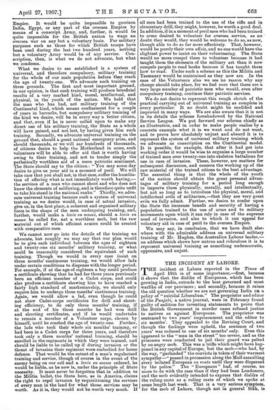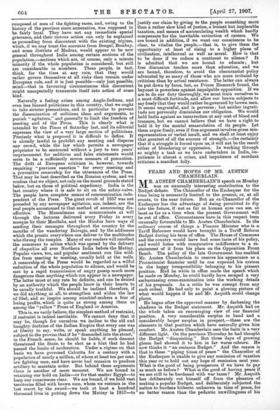THE INCIDENT AT LAHORE.
THE incident at Lahore reported in the Times of April 18th is of some importance,—first, because it shows that the dislike of Europeans, which has been growing in India, extends to the best governed and most warlike of our provinces ; and secondly, because it raises the old question whether we are not governing India on a policy of "suicidal Liberalism." The proprietor and editor of the Punjabi, a native journal, were in February found guilty of sedition for inventing statements to prove that the British Government in murder cases refused justice to natives as against Europeans. The proprietor was sentenced to two years' imprisonment and the editor to six months'. They appealed to the Revising Court, and though the findings were upheld, the sentence of two years' was reduced to one of six months' only. Even this appeared to the "man in the street" too severe, and as the prisoners were conducted to jail their guard was pelted by an angry mob. This was a trifle which might have hap- pened in any capital of Europe; but the mob—who had, by the way, "garlanded" the convicts in token of their warmest sympathy—" passed in procession along the Mall assaulting every isolated European en route until they were dispersed by the police." The " Europeans " had, of course, no more to do with the case than if they had been Londoners, and the mob evidently intended to express that dislike of the ruling caste as a ruling caste of which we spoke at some length last week. That is a very serious symptom, for the mob of Lahore, though not in general Sikh, is
composed of men of the fighting races, and, owing to the history of the province since annexation, was supposed to 'be fairly loyal. They have not any immediate special grievance, and their riotous action can only be explained as proceeding from discontent with the existing regime, which, if we may trust the accounts from Bengal, Bombay, and some districts of Madras, would appear to be now general throughout India among certain sections of the population,—sections which are, of course, only a minute minority if the whole population is considered, but still are considerable in numbers. These people, in fact, think, for the time at any rate, that they would rather govern themselves at all risks than remain. under European rule, and it is just possible—only just possible, mind—that in favouring circumstances this discontent might unexpectedly transmute itself into action of some kind..
Naturally a feeling arises among Anglo-Indians, and even less biassed politicians in this country, that we ought to take stricter precautions, and in particular to prevent the dissemination of seditious ideas and arguments, to punish " agitators," and generally to limit the freedom of meeting and of the Press. This is clearly what is intended by the Times of Saturday last, and its editorial expresses the view of a very large section of politicians. Precisely what is proposed it is difficult to define. It is already lawful to prohibit any meeting and disperse any crowd, while the law which permits a newspaper proprietor to be sentenced without a jury to two years' imprisonment for seditious and false statements would seem to be a sufficiently severe measure of precaution. The drift of European criticism is, however, towards requiring "previous sanction" for every meeting and a preventive censorship for the utterances of the Press. That may be best described as the Russian system, and we confess that we object, not only on the moral grounds stated below, but on those of political expediency. India is the last country where it is safe to sit on the safety-valve. The people have complete means of communication inde- pendent of the Press. The great revolt of 1857 was not preceded by any newspaper agitation, nor, indeed, are the real people accustomed to that method of announcing dis- affection. The Mussulmans can communicate at will through the lectures delivered every Friday in every mosque by their Moollaha, and the Hindus have ways of sending their messages throughout the country by the mouths of the wandering Bairagis, and by the addresses which the priests everywhere can deliver to the multitudes who throng the temples. Many of our readers will recollect the summons to action which was spread by the delivery of chupailies all over Northern India before the Mutiny. Popular views, too, and popular sentiment run like wild- fire from meeting to meeting, usually held at the wells. A censorship of the Press would be regarded as a wilful reduction of the whole population to silence, and would be met by a rapid transmission of angry gossip much more dangerous than anything which can appear in a newspaper. The latter must at any rate be, definite, and can be denied by an authority which the people know iu their hearts to be usually truthful. We should be inclined therefore, if we did anything at all, to strengthen and widen the law of libel, and so inspire among mischief-makers a fear of losing profits, which is quite as strong among them as among the "yellow " Press of England or America.
This is, we verily believe, the simplest method of restraint, if restraint is indeed inevitable. We cannot deny that it may be, though for ourselves we incline to the old and haughty doctrine of the Indian Empire that every one was at liberty to say, write, or speak anything he pleased, subject to the proviso that if he " descended into the street," in the French sense, he should be liable, if such descent threatened the State, to be shot as a hint that he had passed the limits of moderation. Under a regime on that basis we have governed Calcutta for a century with a population of nearly a million, of whom at least ten per cent. are fighting men, and have never had occasion to produce artillery to maintain order. But behind these arguments there is another of more moment. We are bound in retaining our hold on India—or for that matter Egypt—to keep our consciences dear. We are bound, if we hold vast territories filled with brown men, whom we restrain in the last resort by the sword—we took at least a hundred thousand lives in putting down the Mutiny in 1857—to justify our claim by giving to the people something more than a rather slow kind of justice, a lenient but implacable taxation, and means of accumulating wealth which hardly compensate for the inevitable extinction of careers. We are bound in addition, if we want our consciences to be clear, to vitalise the people,—that is, to give them the opportunity at least of rising to a higher plane of civilisation, intellectual as well as moral. How is that to be done if we reduce a continent to silence ? It is admitted that we are bound to educate ; but free discussion teaches more than education, and we are bound, therefore, to avoid the obscurantist policy advocated by so many of those ,who are more irritated by criticism than by actual resistance. The latter can always be put down by force, but, as Prince Bismarck found, the bayonet is powerless against impalpable opposition. If we are to do our duty thoroughly, we must train ourselves to a most difficult fortitude, and allow our brown subjects to say freely that they would rather be governed by brown men. It seems ungrateful, and is perverse ; but neither ingrati- tude nor perversity diminishes our obligation. We would hold India against an insurrection at any cost of blood and treasure, but we cannot believe that we have a right to hold it by the mental emasculation of its people. Let them argue freely, even if free argument involves gross mis- representation or verbal insult, and we shall at least enjoy that greatest of all the sources of strength,---the certainty that if a struggle is forced upon es, it will not be the result either of blundering or oppression. In working through so mighty a task as we have undertaken in India, im- patience is almost a crime, and impatience of mordant criticism a manifest folly.



























































 Previous page
Previous page